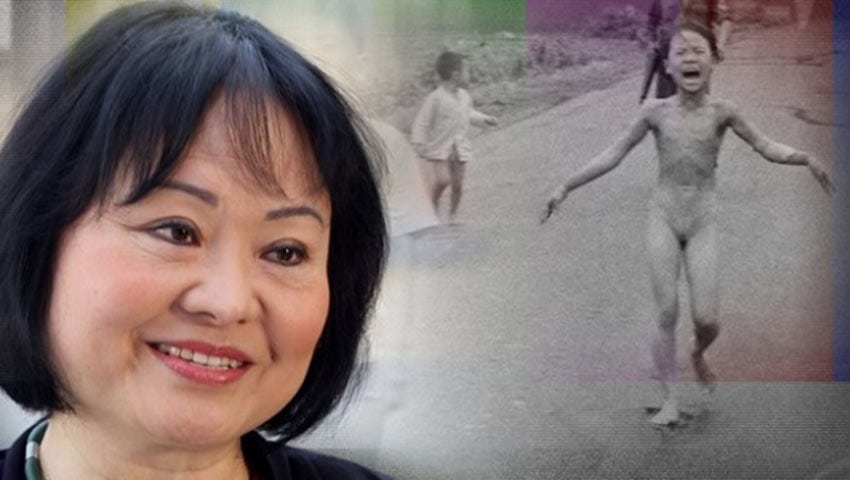Even without the benefit of context, the image of a naked 9-year-old girl running for her life is as searing and indelible today as it was 49 years ago.
That image jolted people around the world. Some say it hastened the end of the Vietnam War.
“I always remember that horrible day that we ran from life to death,” says Kim Phuc, the girl in that iconic photo. Now 57, she lives just outside Toronto, a wife, mother and survivor inextricably linked to a photograph that dominated front pages in 1972, seven months before the signing of Paris Peace Accords led to the withdrawal of U.S. combat forces from South Vietnam.
In the beginning, says Phuc, she hated the photo. It embarrassed her. And she struggled with the publicity that surrounded it. For her. it was personal: It captured a moment of torment — her face frozen in an agonizing wail moments after a napalm attack burned and disfigured her for life.
In fact, no one would blame Phuc if she had tried to get as far away from the image as possible. But that is not what she did.
After a long struggle, Phuc came to realize that if her pain and terror had not been captured on film that day, the bombing — like so many other wartime horrors — might have been lost to history.
She began to think about what the photograph could give, rather than what it could take away.
Eventually, the photo became much more than a depiction of a moment in time to Phuc — it became what she calls “a path to peace.”
“I realized that if I couldn’t escape that picture, I wanted to go back to work with that picture for peace. And that is my choice.”
‘I can work with that picture for peace’
It’s hard to square the anguish and terror of the girl in the picture with the warm, relaxed, engaging presence that is Kim Phuc today.
Besides being a loving wife and mother, she is a mentor, and a goodwill ambassador for the United Nations. Every year she travels the world to recount her story of survival, to raise awareness about the brutality of war.
In addition to her work with the U.N., Phuc started the Kim Foundation International, a charity that helps children suffering from war, just as she did so many years ago. Its mission is to help the most underprivileged children suffering from war — building hospitals, schools and homes for children who have been orphaned. Phuc says she plans to live out her life in service of that mission.
“That’s why I’m really thankful that I had that picture taken and I can work with that picture for peace.”
Phuc and her husband claimed asylum in Canada more than 20 years ago and have raised two boys there. Phuc says she is very happy in her “second home” and gratified that her parents have been able to join her in Canada.
Now, says Phuc, that terrified little girl in the picture is “not running anymore. She’s flying.”
It was not always so.
‘I saw a girl, naked … running’
In 1972 Phuc lived in the village of Trang Bang, north of Saigon. She and family were sheltering in a temple when they heard planes overhead. Afraid they would be bombed, they ran outside to find safety, just as bombs detonated all around the temple.
The bombs delivered napalm, a flammable liquid that clings to human skin, causing horrific burns when ignited.
Phuc remembers intense heat and excruciating pain. She pulled burning clothes from her body. She ran.
Moments later, a young Associated Press photojournalist took the photograph of his life. Nick Ut was only 21 years old and already a seasoned war photographer when he arrived at that South Vietnamese village.
“I looked through the black smoke and I saw a girl, naked … running,” Ut told CNN this year.
Instinct took over. He started taking pictures as Phuc and the other children ran straight for him.
As Phuc approached, Ut saw parts of her skin falling off. She had torn off her clothes to stop the burning. The napalm already had seared her neck, most of her back, and her left arm.
“I said: ‘Oh my God I don’t believe she’s burned so badly,'” Ut recalled. “I put my camera down on the highway and tried to help her.”
He poured water on her wounds and covered her with a coat. He picked up Kim and the other children and put them in his van to get them to a hospital.
“Inside my van she said, ‘I’m dying, I’m dying.’ I kept watching her every minute. I said, ‘We will be there soon.'”
‘I learned to forgive’
Phuc spent more than a year in hospitals. Her family feared she would never survive. She underwent countless painful skin grafts and other surgeries and eventually recovered from her physical wounds.
Yet she could not find peace. She wanted to disappear. She even wished for death. She thought if she died she wouldn’t have to suffer mentally, physically and emotionally.
She began to seek answers, studying different religious texts. At 19, she became a Christian, and she credits her faith for helping her embrace life again.
“When I became Christian, I have a wonderful connection — the relationship between me, and Jesus, and God.”
Phuc says she prayed for help: She wanted to move on. She wanted to have kids.
“And from that point,” she says, “I learned to forgive.”
Now Phuc radiates an unmistakeable poise and peace when she tells her story. She says she sees that famous picture as just one of many blessings.
“I really want to thank God that he spared my life when I was a little girl,” she says.
“Whatever happened to me, I have another opportunity to be alive, to be healthful, to be a blessing, to help honor other people.”
